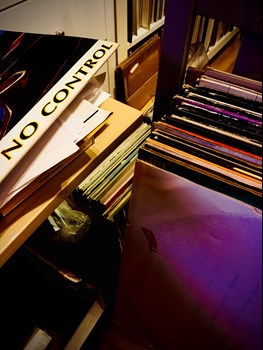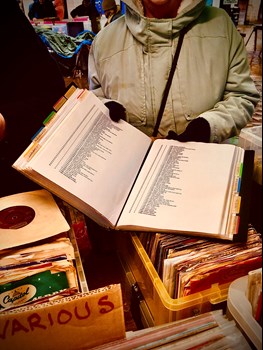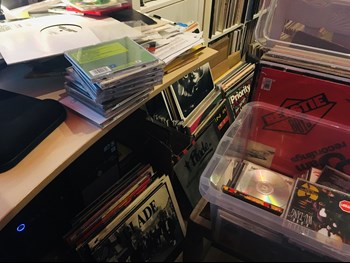Digging and weeding your music collection - The reasons why you should have a music clear out
Wednesday, April 6, 2022
by Tat
When the pandemic hit and derailed our lives in early 2020 many of us took those early few months in lockdown as an opportunity to assess our lives and with that our belongings. With the removal of social events and gatherings we found ourselves suddenly having a lot more time at home to tackle those often neglected chores of sorting through the stuff you accumulate in life. Those artefacts included books, clothes, photos and of course, music. It was an opportunity for some to look through collections they had built up since youth, which may have also included a large stash of club and rave flyers.
Keen music lovers, particularly DJs are always on the hunt for new music, certainly those who are not stuck in the early 1990s with the blinkered belief that nothing better has been produced since that golden era. Being a music collector means records and CDs, physical artefacts that ultimately start to take up a lot of space. It’s not just the older physical formats that can be problematic for a DJ or music fan to contend with. Digital collections also grow to epic proportions and if you did not master file management and building a discoverable folder structure at the start of curating it, the chances are you didn’t later on. The problem with physical things like records is that they take up space, just a couple of thousand records can start to take over your average room space. The problem with digital is that it doesn’t really take up space given how cheap hard drives are these days. You end up with one collection that overwhelms you when you walk into a room and another that can be impossible to go through if you haven’t filed things properly onto your computer. Naturally no DJ would rather spend their time being an amateur librarian or data manager for their collection, but not having a system means more time finding the music you want to play.

Lost control of your collection?
We all remember the early 2000s when DJs and music fans started to profess their love of the new formats for playing and sharing music. People regularly commented that they now could store 1000 tunes on a small drive, then it became 10,000 and then 100,000. Music sharing and piracy became commonplace between some. The idea that you could suddenly own 10,000 tracks by giving someone a hard drive was not only immoral but it was impractical. Who has the time to sift through 10,000 tracks? The chances are that even the most enthusiastic of DJs would have found such an instant collection exciting but ultimately that rush of adrenalin probably soon waned with the realisation they had to manually wade through all of those tracks trying to sort out the wheat from the chaff. At least Trackhunter does all of that work for you whilst you go about other things.
For the vinyl and CD DJ there is another other problem, that many of these collections have been curated over the course of several decades. DJs who started buying their first 12 inches in the 1970s might now find themselves looking at walls of records, most of which are unidentifiable in faceless black disco sleeves. The late 1980s and 1990s witnessed a boom in releases from both major and independent record labels. This spurred on a whole cottage industry for the promotional and second hand market. It became quite easy to go into London on a Saturday afternoon and return home with 50 records that needed double bagging for the journey back on the Tube.
Collections continued to grow and like the aforementioned digital collections that often came with lots of fillers (edits, dubs, instrumentals, remixes), vinyl collections didn’t always mature at the same pace as the owner’s tastes. You might have been heavily into big beat, hard house, breakbeat and other genres that were popular in the 1990s, but in 2022 your tastes might have changed considerably, your record shelves and hard drives just bloated with music you no longer care for. Even though you might have a hankering for some of the tracks of a previous generation, are you really ever likely to dig out a set of 1990’s hardcore industrial techno when these days you find yourself excited by deep house or disco edits?
I have periodically weeded my music collection and decided at the start of the year that I would catalogue my entire vinyl and CD collection on Discogs. It was something I had started a few years ago and decided that it would be worthwhile at this stage to carry on. Naturally this can be a time-consuming job and it is something we all could easily say ‘we do not have the time for’. The results of this exercise, which has taken up numerous evenings over a few months, have been very rewarding. I’m yet to complete the task and it will take some months to finish but I have completed two of the three rooms where my music is stored. It has been a worthwhile exercise for a few reasons.
Firstly, weeding out things I no longer care for. This is something I have done for the last twenty years and especially after starting a family as I could no longer think about filling every shelf in the house with records, although it sometimes looks like I have. Weeding is easier than you think and once you give yourself permission to let records go up on Discogs, to friends or the charity shop then it becomes a habit. You get to discover that many of those records you believed were rare or worth a small fortune are invariably not going to pay for your early retirement. However the flip side is that records you had forgotten ever buying, nevermind own can be worth ten or twenty times what you originally paid for them. You may realise that many of the records you loved in 1995 no longer have any emotional ties and are worth more to someone else and can put some money into your bank account. You also discover lots of other less valuable records that you had simply forgotten about and there is a bonus to that, which I will discuss later. The rediscovery process, as with digital collections, can reconnect you with hundreds of forgotten gems and I have even found dozens of records that were still on my Discogs wantlist. On a recent trip to a local record fair I came across an elderly couple, with the husband rifling through a box of 1960s 7 inch singles, his wife was by the side of him with one of their five folders of carefully organised records in their collection. I had to admire their organisational skills and passion for discovering new music so late in life.

Whether you are sorting through a digital or physical collection, it is important to remember the ultimate goal is not to have the biggest collection, but the best collection you can own. I am sure that when you see some DJs in front of massive collections that there is every chance that they no longer care for parts of it. It does no longer reflect them or their tastes, it just takes up room. I’m also a digital DJ and use Traktor 3 Pro and in recent years have taken to deleting folders of music I no longer care for, despite having the space. If, like me, you are on multiple DJ mailing lists then it’s a good habit to only download the tracks you really want to play out rather than just see them as freebies to swell your collection.
Weeding is also an opportunity to look after those most valuable of records, whether that be financial or sentimental value. One way to do that is to buy good quality protective sleeves as well as replacement plastic lined inside sleeves as paper ones are more likely to harbour dirt and dampness more than plastic, especially if you store them in a damp room. Looking after your most valuable records will eventually reward you, when that time comes to sell them and buyers are after the best looked after vinyl at the highest price.
As with the shift in scenes and notably age, the ability to pitch down house, disco, techno and other sounds can suddenly breathe new life into the records. It might not work for every record, and I have tried to put the thought out of mind as to all the great records I have sold that probably sound good pitched down to compliment some of the newer chuggy, tribal sounds. That periodical shift in pace has been common since the sped up sounds of northern soul and disco stood aside to be replaced by a slower sound through rare groove and electro.
There will always be records and CDs you will regret letting go of, but the problem is that once your collection gets to a certain size, say for example 3000 records or 10000 audio files, you start to forget what you actually own, especially if you don’t DJ out or play them at home on a regular basis. Humans by their very nature struggle with too much choice and as a result can start to suffer with decision fatigue. The same might be said of DJs who use Spotify, Tidal and iTunes. When you have a million tracks in front of you, which ones do you play in your set? Of course curation helps with that and creating playlists and setting parameters can be very useful, remember that a vinyl DJ can only carry so many records, so why not limit all DJ sets in the same way. There are DJs who benefit from accessing 10,000 plus tracks via the web or hard drive but they are invariably the ones driven by requests from the dancefloor, rather than crafting a journey for the crowd.

Ultimately with a physical collection there will be a time when you either decide to let go of it or it lets go of you. You might like to think of it as an inheritance for your kids but our partners and children will be left with these collections and to a large extent they might not want, or at least all of them. My daughter told me that she would like some of my records for when I'm gone and that I should show her which the best ones are. I’m sure she will never have the emotional buzz from listening to Ron Trent’s ‘Altered States’’ but she might appreciate working her way through my many Late Night Tales compilations. With any luck, that won’t be for a few decades, so until then it’s good to have everything in order. Of course if your collection is on a laptop it's probably going to be lost to time and space, unless someone decides they want the ready made collection. Whereas the record and CD collection that remains could be problematic as it is a physical thing that needs attending to. My plan is to continue to Swedish Death Clean, the idea you weed your belongings as you go along to make it easier for those further down the line. I have no plans to die for some time, but I do know that come my autumn years, if my then grown up daughter hasn’t discovered the delights of acid house or Detroit techno, then it’s unlikely she will be bothered with it then. Hopefully, with a smaller, more manageable collection, she might start to explore it and for the next couple of decades, with my collection now on Discogs, I can start to see what I really do own again and more importantly start to play it and reconnect with it in a new way.
Discover new digital dance music with Trackhunter







